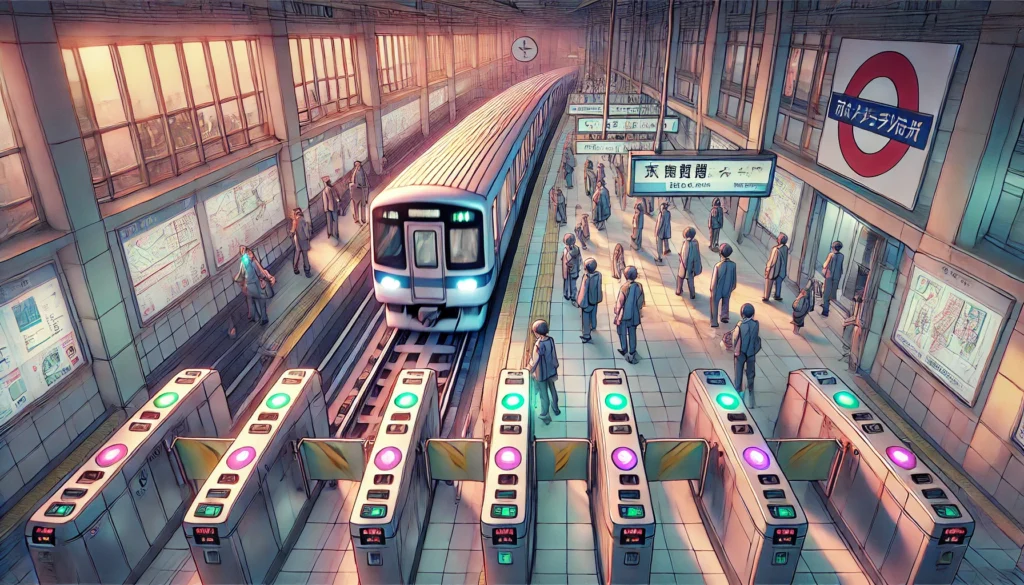Have you ever found yourself standing in a bustling Japanese train station, surrounded by incomprehensible announcements and bewildering signage? If you’re planning a trip to Japan or simply want to expand your Japanese vocabulary, understanding how to say “train in Japanese” and mastering related railway terminology is absolutely essential.
Japan’s railway system is renowned worldwide for its efficiency, punctuality, and complexity. With over 27,000 kilometers of tracks connecting even the most remote areas, trains are the lifeblood of Japanese transportation. Yet for visitors and language learners, this impressive network can quickly become overwhelming without the right vocabulary at hand.
In this guide, we’ll explore the essential words and phrases you need to confidently navigate Japan’s railway system, from purchasing tickets to finding your platform and understanding announcements. No more feeling lost in translation when it comes to train travel in Japan!
Want to start learning Japanese right away?
Access our Free Study Guides with grammar explanations, vocabulary lists, and study tips. All at no cost.
The Basic Words for Train in Japanese
Let’s start with the fundamentals. There are several words for “train in Japanese,” each with specific contexts and nuances:
電車 (Densha) – The Most Common Term
The word you’ll use most frequently is 電車 (densha), which specifically refers to electric trains. This is the standard term for trains in urban and suburban areas.
Example:
- 電車に乗ります。
- Densha ni norimasu.
- I’m getting on the train.
列車 (Ressha) – Formal Term for Trains
列車 (ressha) is a more formal term for trains, especially those with multiple cars. You’ll often hear this word in official announcements at stations.
Example:
- 次の列車は3番線に到着します。
- Tsugi no ressha wa san-ban-sen ni touchaku shimasu.
- The next train will arrive at platform 3.
新幹線 (Shinkansen) – Bullet Train
Japan’s famous 新幹線 (shinkansen) or bullet train deserves its own category. These high-speed trains connect major cities at speeds of up to 320 km/h.
Example:
- 東京から大阪まで新幹線で行きます。
- Tokyo kara Osaka made shinkansen de ikimasu.
- I’m going from Tokyo to Osaka by bullet train.
Similar to how the fastest trains in Japan vary in speed and service type, the vocabulary for trains also changes depending on the context.
地下鉄 (Chikatetsu) – Subway
Underground trains have their own term: 地下鉄 (chikatetsu), which literally means “underground iron.”
Example:
- 渋谷へは地下鉄が便利です。
- Shibuya e wa chikatetsu ga benri desu.
- The subway is convenient for going to Shibuya.
Essential Station Vocabulary
Now that you know how to say “train in Japanese,” let’s explore the vocabulary needed to navigate train stations:
駅 (Eki) – Station
The Japanese word for station is 駅 (eki), a crucial term for any train traveler.
Example:
- 次の駅で降ります。
- Tsugi no eki de orimasu.
- I’m getting off at the next station.
改札口 (Kaisatsuguchi) – Ticket Gate
The 改札口 (kaisatsuguchi) is where you validate your ticket before entering the platform area.
Example:
- 改札口を出たら右に曲がってください。
- Kaisatsuguchi wo detara migi ni magatte kudasai.
- After exiting the ticket gate, please turn right.
ホーム (Hōmu) – Platform
The platform where you board your train is called ホーム (hōmu), a loanword from English.
Example:
- 1番ホームから発車します。
- Ichi-ban hōmu kara hassha shimasu.
- The train will depart from platform 1.
乗り換え (Norikae) – Transfer
When changing trains, you’ll need to 乗り換え (norikae), or transfer.
Example:
- 新宿で山手線に乗り換えてください。
- Shinjuku de Yamanote-sen ni norikae shite kudasai.
- Please transfer to the Yamanote Line at Shinjuku.
Ticket Types and Purchasing
Understanding ticket vocabulary is crucial for using trains in Japan:
切符 (Kippu) – Ticket
The general word for ticket is 切符 (kippu).
Example:
- 切符を買いたいです。
- Kippu wo kaitai desu.
- I want to buy a ticket.
片道 (Katamichi) – One-way
For a one-way ticket, use 片道 (katamichi).
Example:
- 東京駅まで片道お願いします。
- Tokyo eki made katamichi onegaishimasu.
- One-way to Tokyo Station, please.
往復 (Ōfuku) – Round-trip
A round-trip ticket is 往復 (ōfuku).
Example:
- 往復切符は片道より安いです。
- Ōfuku kippu wa katamichi yori yasui desu.
- Round-trip tickets are cheaper than buying two one-way tickets.
定期券 (Teikiken) – Commuter Pass
Regular commuters use a 定期券 (teikiken), or commuter pass.
Example:
- 学生は定期券の割引があります。
- Gakusei wa teikiken no waribiki ga arimasu.
- Students get a discount on commuter passes.
Love Japan? Stay in the Loop!
Hi, I’m Jesse! Join 100+ learners and get my best Japanese learning tips straight to your inbox.
Types of Trains in Japanese
Japan has several types of trains with varying speeds and stops:
普通 (Futsū) – Local Train
普通 (futsū) trains stop at every station.
Example:
- 普通電車は各駅に停まります。
- Futsū densha wa kaku eki ni tomarimasu.
- Local trains stop at every station.
急行 (Kyūkō) – Express
急行 (kyūkō) trains skip some stations to provide faster service.
Example:
- 急行は小さな駅には停まりません。
- Kyūkō wa chiisana eki ni wa tomarimasen.
- Express trains don’t stop at small stations.
特急 (Tokkyū) – Limited Express
特急 (tokkyū) trains are even faster, stopping only at major stations.
Example:
- 特急に乗るには特別な切符が必要です。
- Tokkyū ni noru ni wa tokubetsu na kippu ga hitsuyō desu.
- You need a special ticket to ride the limited express train.
Just as the world-class infrastructure of Japan supports these efficient train systems, your language skills will be better supported with this essential vocabulary.
Useful Phrases for Train Travel
Here are some practical phrases to help you navigate Japanese trains:
Asking for Help
- この電車は東京に行きますか?
- Kono densha wa Tokyo ni ikimasu ka?
- Does this train go to Tokyo?
- 何番線ですか?
- Nan-ban-sen desu ka?
- Which platform number is it?
Train Status
- 次の電車は何時ですか?
- Tsugi no densha wa nanji desu ka?
- What time is the next train?
- 電車が遅れています。
- Densha ga okurete imasu.
- The train is delayed.
For more expressions to help you communicate in various situations, check out our guide on how to use “tondemonai” – a versatile Japanese expression that might come in handy when reacting to unexpected train situations!
Tips for Mastering Train Vocabulary
- Make flashcards with train terms on one side and their meanings on the other
- Practice with real scenarios by planning hypothetical train journeys
- Label a train system map in Japanese to familiarize yourself with terminology
- Listen to train announcements online to practice comprehension
For comprehensive guides and audio pronunciation examples of these train-related terms, visit our Resources page where you can access free guides to accelerate your Japanese learning journey.
Frequently Asked Questions About Train in Japanese
What is the difference between densha and ressha?
Densha (電車) specifically refers to electric trains and is commonly used for everyday conversation about trains in urban areas. Ressha (列車) is a more formal word for trains, particularly those with multiple cars, and is often used in official announcements.
Do I need to know Japanese to use trains in Japan?
While major stations in Tokyo and other tourist areas have English signage, knowing basic train vocabulary in Japanese will significantly enhance your travel experience, especially in rural areas where English support may be limited.
What does “JR” stand for in Japanese train systems?
JR stands for Japan Railways, the main railway company group that operates throughout Japan. It was formed after the privatization of the government-owned Japanese National Railways in 1987.
How do I ask which platform my train departs from?
You can ask: “どのホームから発車しますか?” (Dono hōmu kara hassha shimasu ka?) which means “From which platform does it depart?”
How punctual are Japanese trains?
Japanese trains are famously punctual, with average delays of less than one minute. Operators will even issue delay certificates if trains are running more than five minutes behind schedule.
Conclusion
Mastering train vocabulary in Japanese opens up the entire country for exploration. From navigating complex urban networks to enjoying scenic rural lines, understanding how to talk about trains in Japanese will transform your travel experience from stressful to seamless.
Whether you’re asking directions, purchasing tickets, or understanding announcements, the vocabulary we’ve covered will help you travel with confidence. The next time you hear “densha ga mairimasu” (電車が参ります – the train is arriving), you’ll know exactly what to do.
Train in Japanese is primarily called “densha” (電車) which refers to electric trains, while “ressha” (列車) is a more formal term, and specialized trains like the bullet train have their own names such as “shinkansen” (新幹線).
Keep practicing these essential words, and you’ll soon navigate Japan’s impressive railway system like a local!
Connect with Fellow Japanese Learners!
Ask questions, get study tips, and take part in weekly challenges. Join a community of motivated learners exploring both the language and culture of Japan!




